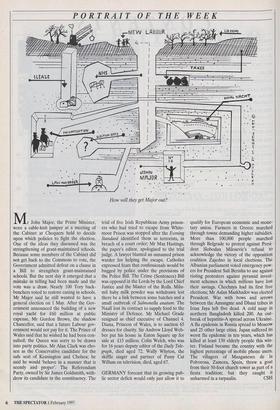PORTRAIT OF THE WEEK
How will they get Major out?
Mr John Major, the Prime Minister, wore a cable-knit jumper at a meeting of the Cabinet at Chequers held to decide upon which policies to fight the election. One of the ideas they discussed was the strengthening of grant-maintained schools. Because some members of the Cabinet did not get back to the Commons to vote, the Government admitted defeat on a clause in a Bill to strengthen grant-maintained schools. But the next day it emerged that a mistake in telling had been made and the vote was a draw. Nearly 100 Tory back- benchers voted to restore caning in schools. Mr Major said he still wanted to have a general election on 1 May. After the Gov- ernment announced the building of a new royal yacht for £60 million at public expense, Mr Gordon Brown, the shadow Chancellor, said that a future Labour gov- ernment would not pay for it. The Prince of Wales said that he wished he had been con- sulted; the Queen was sorry to be drawn into party politics. Mr Alan Clark was cho- sen as the Conservative candidate for the safe seat of Kensington and Chelsea; he said he would 'behave in a manner that is seemly and proper'. The Referendum Party, owned by Sir James Goldsmith, with- drew its candidate in the constituency. The trial of five Irish Republican Army prison- ers who had tried to escape from White- moor Prison was stopped after the Evening Standard identified them as terrorists, in breach of a court order; Mr Max Hastings, the paper's editor, apologised to the trial judge. A lawyer blamed an unnamed prison warder for helping the escape. Catholics expressed fears that confessionals would be bugged by police under the provisions of the Police Bill. The Crime (Sentences) Bill was opposed in the Lords by the Lord Chief Justice and the Master of the Rolls. Milu- mil baby milk powder was withdrawn lest there be a link between some batches and a small outbreak of Salmonella anatum, The Naafi lost its contract to supply food to the Ministry of Defence. Mr Michael Grade resigned as chief executive of Channel 4. Diana, Princess of Wales, is to auction 65 dresses for charity. Sir Andrew Lloyd Web- ber put his house in Eaton Square up for sale at £15 million. Colin Welch, who was for 16 years deputy editor of the Daily Tele- graph, died aged 72. Wally Whyton, the skiffle singer and partner of Pussy Cat Willum on television, died, aged 67.
GERMANY forecast that its growing pub- lic sector deficit would only just allow it to qualify for European economic and mone- tary union. Farmers in Greece marched through towns demanding higher subsidies. More than 100,000 people marched through Belgrade to protest against Presi- dent Slobodan Milosevic's refusal to acknowledge the victory of the opposition coalition Zajedno in local elections. The Albanian parliament voted emergency pow- ers for President Sali Berisha to use against rioting protesters against pyramid invest- ment schemes in which millions have lost their savings. Chechnya had its first free elections; Mr Aslan Maskhadov was elected President. War with bows and arrows between the Amungme and Dhani tribes in Irian Jaya left five dead. A cold snap in northern Bangladesh killed 200. An out- break of hepatitis-A spread across Ukraine. A flu epidemic in Russia spread to Moscow and 25 other large cities. Japan suffered its worst flu epidemic in ten years, which has killed at least 130 elderly people this win- ter. Finland became the country with the highest percentage of mobile phone users, The villagers of Manganeses de in Polvorosa, Zamora, Spain, threw a goat from their 50-foot church tower as part of a fiesta tradition; but they caught it unharmed in a tarpaulin. CSH


























































 Previous page
Previous page